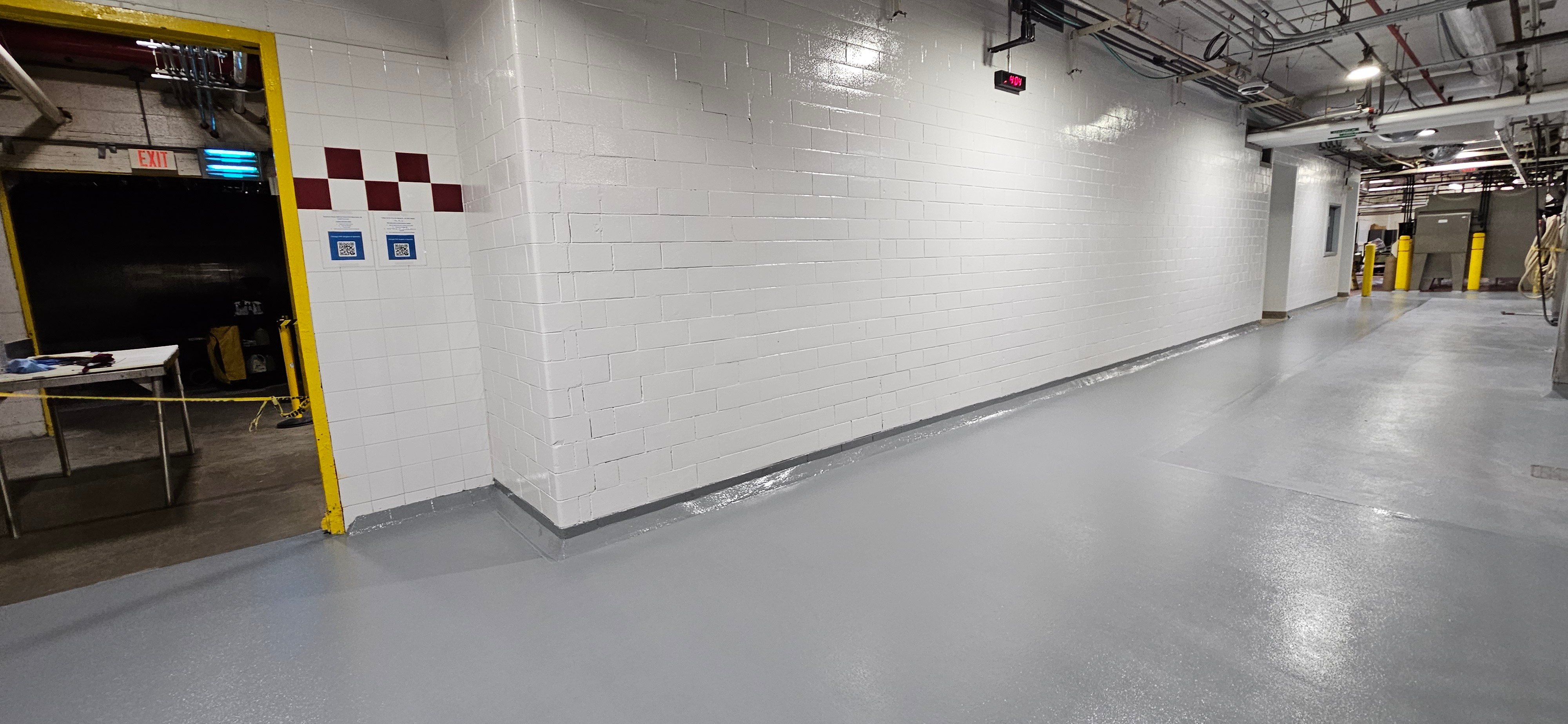
Urethane cement is one of the most durable flooring systems available today, designed to withstand extreme conditions like heavy traffic, chemical exposure, and temperature fluctuations. Because of its seamless, non-porous surface, it’s also a preferred choice for industries such as food and beverage, pharmaceuticals, and manufacturing where sanitation and safety are critical.
But even with its toughness, urethane cement flooring requires regular care to maintain its performance. Without proper cleaning, dirt, grease, and chemical residues can build up, affecting both safety and longevity. At CustomCrete, we’ve installed urethane cement systems in demanding environments across Chicago, Kenosha, Milwaukee, Madison and beyond, and we know that a strong cleaning routine makes all the difference.
In this guide, we’ll walk you through the best practices for keeping your urethane cement floors clean, safe, and long-lasting.
Why Proper Cleaning Matters
The appeal of urethane cement goes far beyond durability. Its hygienic properties and resistance to bacteria make it ideal for facilities where cleanliness is non-negotiable. However, if floors aren’t cleaned properly, even the most resilient system can start to lose its edge.
Poor cleaning practices may lead to:
- Slippery surfaces from grease or liquid build-up
- Staining from food, oils, or chemicals
- Reduced resistance to abrasion or impact
- Shortened lifespan of the flooring system
The good news is that urethane cement is easier to clean than many alternatives, especially when you use the right methods and tools.
Daily Cleaning Practices
For most facilities, daily cleaning is the best way to keep urethane cement floors in peak condition.
- Dust Mop or Sweep
Start by removing loose dirt, dust, or debris. This prevents particles from being ground into the surface during wet cleaning. - Wet Mop or Auto-Scrub
Use a neutral or low-pH cleaner mixed with warm water. Apply it with a mop or, for larger spaces, an auto-scrubber. The seamless nature of urethane cement makes it easy to clean thoroughly. - Rinse with Clean Water
Always rinse away any cleaning solution. Leaving residue on the floor can cause buildup and slippery surfaces.
Weekly or Deep Cleaning
In high-traffic areas or facilities exposed to heavy contaminants, a deeper cleaning routine should be added at least once a week.
- Degreasing Cleaners: If your facility works with oils or grease, use a degreaser approved for urethane cement flooring. These cleaners help lift stubborn residues that neutral cleaners may not remove.
- Mechanical Scrubbing: For heavily soiled areas, pair a cleaning solution with an auto-scrubber or rotary scrubber equipped with soft pads to avoid scratching the surface.
- Spot Treatment: Address stains quickly. Leaving chemical or organic spills untreated can affect the finish of the floor over time.
Avoiding Common Cleaning Mistakes
Even though urethane cement is resilient, improper cleaning can reduce its performance. Here are some mistakes to avoid:
- Harsh Chemicals: Avoid strong acids, alkalis, or bleach unless specified as safe for urethane cement. These can wear down the protective surface.
- Abrasive Tools: Steel wool or overly aggressive scrubbing pads can scratch the surface and compromise durability.
- Skipping Rinses: Soap residue attracts dirt and can make floors slippery. Always follow up with a rinse.
- Infrequent Cleaning: Waiting too long between cleanings allows grime and oils to penetrate, making it harder to restore the floor’s original look.
Industry-Specific Cleaning Needs
Every facility has unique cleaning challenges depending on its operations.
- Food and Beverage Facilities: Frequent washdowns with hot water can stress some flooring systems, but urethane cement is designed to handle thermal shock. Still, consistent sanitation practices with low-pH cleaners are critical.
- Pharmaceutical Plants: Dust and microbial control require daily auto-scrubbing and spot cleaning to maintain compliance.
- Industrial Warehouses: Dirt and tire marks from forklifts should be managed with daily sweeping and weekly machine scrubbing.
Extending the Life of Urethane Cement Floors
Regular cleaning isn’t just about appearances—it protects your investment. By sticking to a structured cleaning routine, businesses can:
- Extend the lifespan of their flooring system
- Maintain compliance with health and safety regulations
- Reduce long-term repair costs
- Provide a safer, cleaner environment for staff and customers
CustomCrete clients often find that when their urethane cement floors are properly maintained, they perform reliably for decades, even under extreme use.
Conclusion
Urethane cement is built to perform in some of the toughest environments, but like any flooring system, it needs proper care to deliver its full benefits. Daily sweeping, mopping, and periodic deep cleaning with the right products will keep your floors sanitary, slip-resistant, and durable for the long haul.
If your facility relies on clean, safe, and long-lasting flooring, adopting a proper cleaning routine is essential.
Request a Quote: Ready to install or upgrade to urethane cement flooring? Request a quote from CustomCrete today and see how we can deliver the right solution for your facility.
Topics:









.jpg?width=7008&height=4672&name=CC101560%20(1).jpg)









.jpg?width=2048&height=1365&name=CC103622%20(2).jpg)
.jpg?width=1200&height=1600&name=Copy%20of%20IMG_1457%20(1).jpg)


